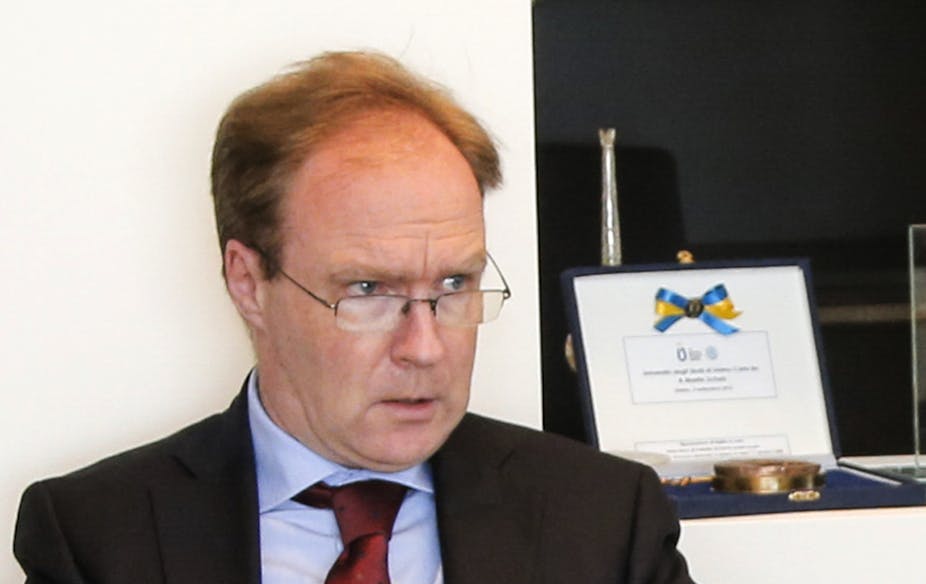Ivan Rogers, who has resigned as the UK’s permanent representative to the EU was known to his peers as a public servant who genuinely understood the value of the neutral pursuit of the national interest. Clearly highly intelligent, he has been aware of – as he often made explicit – the fact that there are competing visions for the UK’s future. But, as with most public servants at his level of seniority and expertise, he proved able to empathise with these different visions while respecting the democratic mandate of the government he served.
It is therefore troubling that he has felt the need to resign just two months before the time when Theresa May, the British prime minister, has pledged to trigger Article 50 and begin the formal process of negotiating the UK’s departure from the UK. It appears Rogers decided to leave following criticism of his claim that it may take up to ten years for the UK to settle a trade deal with the rest of the EU. Rogers was, of course, only stating the reality that many (also highly derided) legal and economic experts have described.
Yet for Arron Banks, one of those who bankrolled the leave campaign, Rogers was insufficiently “optimistic” about Brexit. Indeed, for UKIP MEP Nigel Farage, “pessimistic” Rogers is not the only one who should depart. The entire Foreign Office should be “cleared out” following Rogers’ resignation, in his view.
This form of commentary is especially worrying for its wider consequences. It is not unusual for political figures to criticise civil servants. However, until now, this has occurred relatively infrequently in Britain. Politicians are generally viewed as responsible for strategic failings, but not civil servants who are unable to state their own case.
From any reasonable vantage point, Rogers was working hard to represent the British government. That has been an incredibly challenging task since May appointed ministers with radically different views on how to deliver Brexit. Organisational turbulence has compounded problems, with the unnecessary creation of a new department under a minister with a reputation for ignoring advice rather than following it.
Rogers’ task would have been difficult even if the UK had a coherent government position on Brexit. Unpicking the web of relationships that form the most complex and interdependent trade area ever created was always going to be tricky. Even something as simple as whether a new relationship can be created with the EU in the two years following the triggering of Article 50 is legally ambiguous.
There is a mind-boggling range of Brexit-related issues requiring resolution, which are all in theory somehow to be coordinated by the Department for Exiting the EU. For example, which EU agencies should the UK continue to be engaged with, and how? How will pan-European mechanisms such as the European arrest warrant work – or otherwise – in the UK in the future? If new arrangements are sought, will these be negotiated individually or collectively, and with the EU as a whole, or bilaterally? If the latter, how should they be sequenced?

All these issues run in parallel with the political challenges of ensuring that the UK obtains as good a deal as possible. And all the discussion must go on in a febrile atmosphere where decision making is increasingly both presented and operated as a zero-sum game. Compromise is becoming harder at all levels – national (given the upcoming German and French elections) and European (with the European Parliament’s vote on the UK’s exit deal set to take place right in the middle of the 2019 European election campaign). There are even regional pressures, given increasingly active local governments – as was seen when Belgian Wallonia interrupted a recent EU trade deal with Canada.
Unsung heroes
At a time like this, with so much uncertainty over how formal processes of government will play out, high-quality civil servants such as Rogers are more important than ever. They ensure that the ship of government continues to sail, even through choppy waters. It is regrettable that politicians have meddled with, criticised and briefed against those very civil servants who are currently gritting their teeth and getting on with delivering the Brexit decision.
British people from the baby boom generation and younger have had a continuous experience of relatively high-quality public administration. Whatever problems have arisen, “they” – the British bureaucrats – have generally “sorted it out”. Very few British people have lived through the chaos and fear that occurs from a genuine vacuum in public administration – as occurred in many post-communist countries – or which arises when the neutrality of public servants is consistently called into question, as happens in many divided societies.
The UK should be grateful for its public servants but it seems their value is only recognised in their absence. That goes for the unfortunate Ivan Rogers as much as for anyone.

